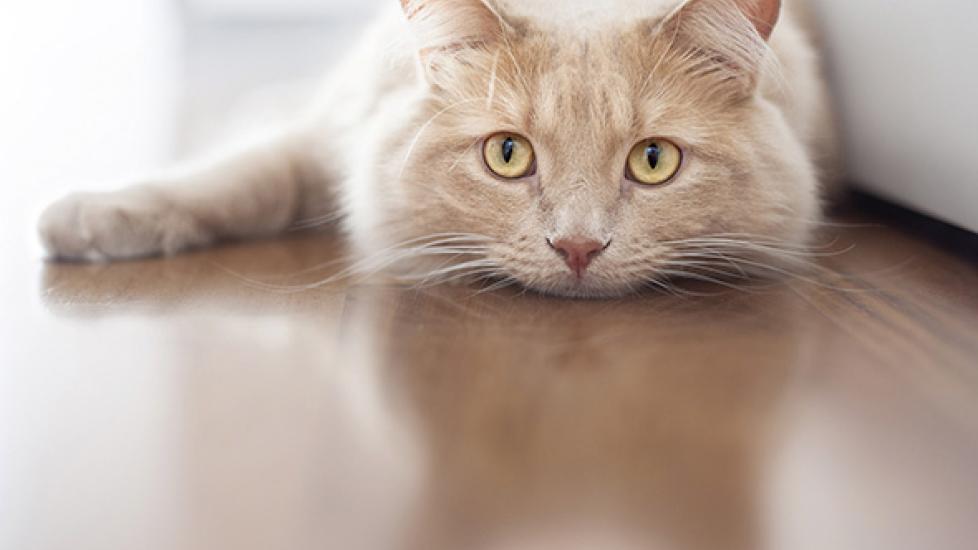Does Your Cat Have Whisker Stress?
If you are noticing that your cat is all of a sudden making messes with her cat food, pulling food out of her bowl to eat on the floor, or is more finicky about her food, some say that whisker stress could be to blame.
The whiskers on your cat’s face are sensitive feeling organs that cats use to gather information about their environment. Cat whiskers collect and send information to their brain—you can think of them as sensitive little antennas that cats use to ‘see’ in the dark.
They are so sensitive that they can determine subtle changes in movement and pressure. Also known as vibrissae, whiskers function to help cats find food, relate spatially to their environment, and avoid potential dangers by detecting movement from potential predators.
What Is Cat Whisker Stress?
Whisker stress, also referred to as whisker fatigue, is a fairly new concept, and like most new ideas, a controversial one. No studies have been done to validate the claim, and without studies backing it up, veterinarians are hesitant to get on board with the idea.
Although there isn’t any research that supports the concept of whisker stress, there have been reports from pet parents who say that their cats experience whisker stress and that their cat’s eating habits improved when they changed the way they fed their cat.
The concept of whisker stress makes sense. If you constantly touch a highly sensitive spot anywhere on the body, it can tend to fatigue the area, and in some cases, even cause stress. If a cat’s highly sensitive face antennas are constantly stimulated every time the cat puts her face in a cat bowl, it could potentially be stressful and painful.
How Do You Know If Your Cat Has Whisker Stress?
Those who uphold the concept of whisker stress point to the following signs:
- Pacing in front of a food or water bowl
- Acting hungry, but doesn’t want to eat from a bowl
- Pawing food out of a bowl and eating it on the floor
Because issues with eating can also be signs of disease or other health problems, always rule these out by taking your cat to the vet.
How Can I Prevent Whisker Fatigue?
If your cat is exhibiting any of the above symptoms and you’ve ruled out health issues, and you suspect whisker stress, then it is time to change the food bowl. An easy first step would be to put the food on a small, flat plate or a mat like the Omega paw hungry pet food mat. Or try a bowl with low sides like Dr. Catsby’s whisker relief cat bowl and see if the symptoms dissipate. If they do, then whisker stress could be the culprit.
When it comes to whisker stress, don’t forget about water bowls. Many cats prefer drinking from a flowing, fresh water source that can be provided with a cat water fountain. A Drinkwell pagoda pet fountain is a stylish way to entice your cat to relax and drink more water—something that is good for all cats!
If you are tempted to trim your cat’s whiskers to solve any potential whisker stress, STOP! Trimming whiskers can be very upsetting and uncomfortable for cats. In general, I do not recommend trimming cat whiskers.
What If It Isn’t Whisker Stress?
In addition to whisker stress, there are many reasons that can cause a cat to develop a finicky appetite or other eating problems. Cats that have painful dental disease can exhibit the same symptoms as whisker stress. Cats that have liver disease, kidney disease, inflammatory bladder conditions or inflammatory bowel disease can also develop eating problems.
Cats can also bully each other around the food bowl, which can cause a cat to develop abnormal eating behavior. Anything that can make a cat feel nauseous can also cause a cat to stop eating.
If you change the bowl and still notice that your cat is exhibiting abnormal eating behavior, it is time for a checkup with your local veterinarian. Remember that cats are masters at hiding their pain and discomfort—a cat has to be suffering significantly before she will let it show. Don’t wait—seek prompt veterinary attention if you notice your cat’s eating behavior changing significantly or if your cat is losing weight.
Image via iStock.com/Stegarau
